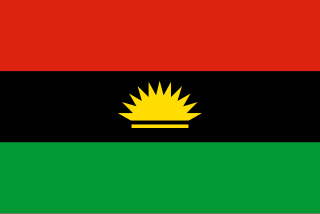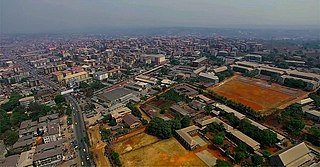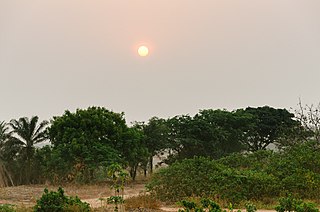Related Research Articles

Biafra, officially the Republic of Biafra, was a secessionist state in West Africa that separated from Nigeria and existed from May 1967 to January 1970. Its territory consisted of the southeastern region of Nigeria, which is predominantly populated by the Igbo people. Biafra was formed by Igbo nationalists who believed they could no longer coexist with Nigeria, leading to the Nigerian Civil War. Nigeria declared war on Biafra shortly after its declaration of independence, eventually resulting in the defeat of Biafra and the reunification of the two states.

The Igbo people ( EE-boh, also ; also spelled Ibo and formerly also Iboe, Ebo, Eboe, Eboans, Heebo; natively Ṇ́dị́ Ìgbò In Nigeria, Igbos are indigenous to various states. Igbos are majorly found in Abia, Anambra, Ebonyi, Enugu and Imo States. A good population of Igbos are found in Delta and Rivers States while Igbos are a minority in Akwa ibom, Benue, Cross River, Edo and Kogi states. Large ethnic Igbo populations are found in Cameroon, Gabon, and Equatorial Guinea, as well as outside Africa. There has been much speculation about the origins of the Igbo people, as it is unknown how exactly the group came to form. Geographically, the Igbo homeland is divided into two unequal sections by the Niger River – an eastern and a western section. The Igbo people are one of the largest ethnic groups in Africa.

Onitsha is a city located on the eastern bank of the Niger River, in Anambra State, Nigeria. A metropolitan city, Onitsha is known for its river port and as an economic hub for commerce, industry, and education. It hosts the Onitsha Main Market, the largest market in Africa in terms of geographical size and volume of goods.

Abia State is a state in the South-East geopolitical zone of Nigeria, bordered to the north and northeast by the states of Anambra, Enugu, and Ebonyi, Imo State to the west, Cross River State to the east, Akwa Ibom State to the southeast, and Rivers State to the south. It takes its name from the acronym for four of the state's most populated regions: Aba, Bende, Isuikwuato, and Afikpo. The state capital is Umuahia while the largest city and commercial centre is Aba.

Owerri is the capital of Imo State in Nigeria, set in the heart of Igboland. It is also the state's largest city, followed by Orlu, Okigwe and Ohaji/Egbema. Owerri consists of three Local Government Areas including Owerri Municipal, Owerri North and Owerri West, it has an estimated population of about 1,401,873 as of 2016 and is approximately 100 square kilometres (40 sq mi) in area. Owerri is bordered by the Otamiri River to the east and the Nworie River to the south.

The Movement for the Actualization of the Sovereign State of Biafra (MASSOB) is a secessionist movement in Nigeria, associated with Igbo nationalism, which supports the recreation of an independent state of Biafra. It was founded in 1999 and is led by an Indian-trained lawyer Ralph Uwazuruike, with headquarters in Okwe, in the Okigwe district of Imo State.

Arochukwu, sometimes referred to as Arochuku or Aro Oke-Igbo, is the third largest city in Abia State in southeastern Nigeria and homeland of the Igbo subgroup, Aro people.

Ebonyi State is a state in the South-East geopolitical zone of Nigeria, bordered to the north and northeast by Benue State, Enugu State to the west, Cross River State to the east and southeast, and Abia State to the southwest. Named for the Abonyi (Aboine) River—a large part of which is in the state's south—Ebonyi State was formed from parts of Abia and Enugu state in 1996 and has its capital as Abakaliki.

Igboland, also known as Southeastern Nigeria, is the indigenous homeland of the Igbo people. It is a cultural and common linguistic region in southern Nigeria. Geographically, it is divided by the lower Niger River into two sections: an eastern and a western one. Its population is characterised by the diverse Igbo culture and the speakers of equally diverse Igbo languages.

The flag of Biafra, used by the Biafran Republic during The Nigerian Civil War 1967- 1970, consists of a horizontal tricolour of red, black, and green, charged with a golden rising sun over a golden bar. The eleven rays of the sun represent the eleven former provinces of Biafra. The rays are typically long and slender with the lowest rays being nearly horizontal and the remaining rays spread evenly between.
Ekweremadu is a Nigerian politician and lawyer from Enugu State who has served in the Senate of Nigeria since May 2003. He is a member of the People's Democratic Party and was the Deputy President of the Nigerian Senate for three consecutive senate.

Ohanaeze Ndigbo is an apex Igbo socio-cultural group in Nigeria. The group represents all Igbo communities within and outside Nigeria. Igbos by census, represent one of the three largest ethnic groups in Nigeria.

Nnamdi Okwu Kanu is a Nigerian pro-Biafra political activist, who is also a British citizen. He is the leader of the Indigenous People of Biafra (IPOB). Kanu founded IPOB in 2014. The main aim of IPOB is to restore the separatist state of Biafra which existed in Nigeria's Eastern Region during the Nigerian Civil War of 1967–1970.

The Indigenous People of Biafra (IPOB) is a separatist organization in Nigeria. Its main aim is to restore an independent state of Biafra in the Old Eastern Region of Nigeria, comprising mainly today's South-East and South-South Regions of Nigeria; and also parts of the Middle Belt states of Nigeria such as Benue State and Kogi State, through an independence referendum. The group was founded in 2012 by Nnamdi Kanu, a British Nigerian political activist known for his prominent advocacy of the contemporary Biafran independence movement. It was deemed a terrorist organization in 2017 under Nigerian Terrorism Act.
The 2015–2016 Killing of Biafran Protesters refers to the killing of demonstrators demanding the restoration of the sovereignty of the Republic of Biafra by Nigerian security forces, especially the Nigerian army, across the southeastern parts of Nigeria. The demonstrations are spearheaded by several secessionist groups. In addition, residents of the above-mentioned region have often been subjected to conditions synonymous with those obtainable in a Police State.
Nimbo is a border town in Uzo-Uwani area of Enugu State, Nigeria, where seven villages- Ekwuru, Nimbo-Ngwoko, Ugwuijoro, Ebor, Enugu-Nimbo, Umuome and Ugwuachara were invaded, and scores massacred by over 500 armed Fulani herdsmen, rated the fourth deadliest terror group in the world, in the early hours of April 25, 2016. Uzo Uwani has boundaries with the Southern States of Ebonyi and Anambra, and Central States of Benue and Kogi, where these attacks have increased lately.

Igbo nationalism refers to a range of ethnic nationalist ideologies relating to the Igbo people of southeastern Nigeria. While the term is defined as seeking Igbo self-determination by some, others argue that it refers to the preservation and revival of Igbo culture and, for others, the development of Igboland stemming from the philosophy, Aku luo uno, which means "wealth builds the home".
Chief John Nnia Nwodo is a Nigerian lawyer, economist, and minister. He serves as 9th President-General of the Ohanaeze Ndigbo.
The insurgency in Southeastern Nigeria is a military conflict that broke out in the city of Orlu, Nigeria on 22 January 2021, when the Nigerian Army moved to crush the paramilitary wing of the Indigenous People of Biafra (IPOB), the Eastern Security Network (ESN). The conflict escalated after the ESN managed to repulse the initial push by the Nigerian Army, but IPOB ended the initial crisis by unilaterally withdrawing the ESN from Orlu. After a few weeks of quiet, Nigeria launched a military offensive in the area to destroy the ESN. On 19 February 2021, IPOB declared that as of the day before, a state of war existed between Nigeria and Biafra. Three weeks later, another separatist group declared the formation of a Biafran interim government which was subsequently endorsed by IPOB. Since then, the Biafran separatists have begun to form alliances with other separatist groups in Nigeria and Cameroon. Despite these developments, the separatists claimed that their militant operations were mainly aimed at defending local communities from armed herders and bandits instead of fighting the Nigerian government. In late June, IPOB leader Nnamdi Kanu was arrested by Interpol and handed over to Nigerian authorities.

The Eastern Security Network (ESN) is the paramilitary organization of the Indigenous People of Biafra (IPOB), a pro-Biafra separatist movement.
References
- ↑ "Field only Igbo presidential candidates in 2023 world Igbo summit tells Nigerian parties Tasks other ethnic groups". newsexpressngr.com. 2016-05-20.
- 1 2 "igbos seek road map for economic prosperity". guardian.ng. 2016-05-20.
- ↑ "group insists on igbo presidency in 2023". punchng.com. 2016-05-20.
- ↑ "igbo summit ohanaeze offers roadmap". leadership.ng. 2016-05-20.
- ↑ "world igbo summit group adopts 50 year plan development igboland". businessday.ng. 2017-05-10.
- ↑ "world igbo summit group commends ohanaeze for successful election". theeagleonline.com.ng. 2015-08-10.
- ↑ "Igbo Summit: Ohanaeze Ndigbo Extends Invitation to IPOB Leaders". May 21, 2018.
- ↑ "Amidst IPOB threat, Ohaneze holds restructuring summit". May 21, 2018.
- ↑ "World Igbo Summit Group commends Ohanaeze for successful election -". January 15, 2017.
- ↑ "World Igbo Summit Group adopts 50-year plan for development of Igboland". March 5, 2017.